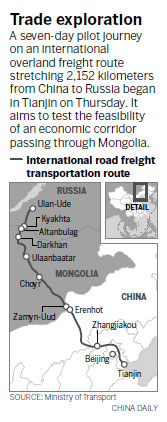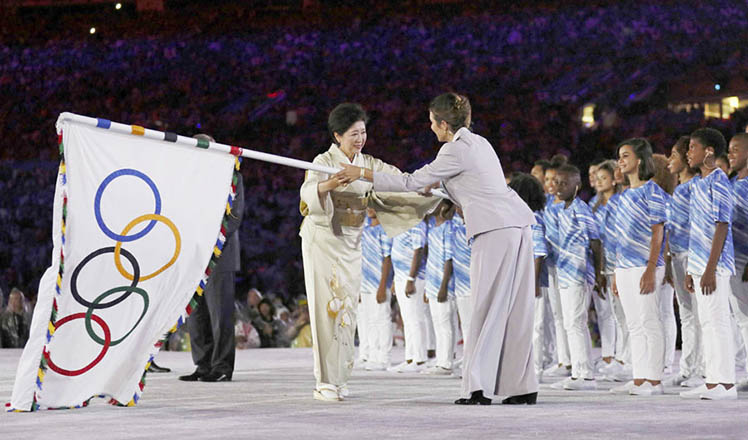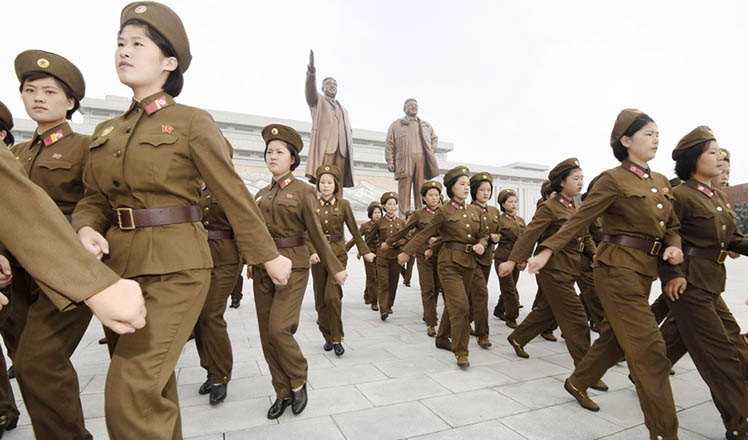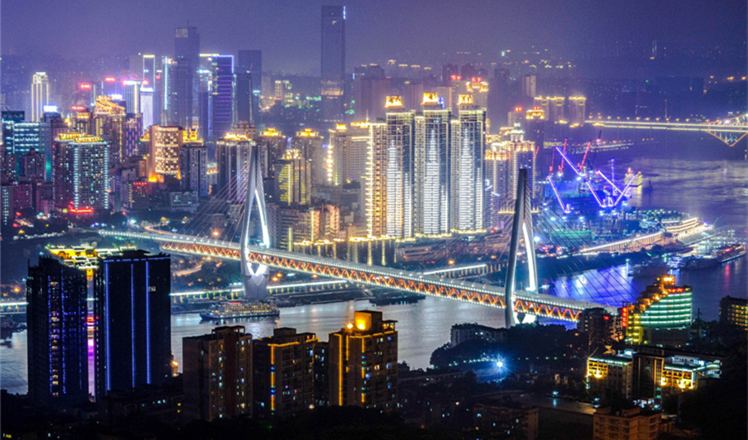International trade corridor tested
Updated: 2016-08-19 07:55
By Luo Wangshu(China Daily)
|
||||||||
A pilot route to simplify international freight transportation across China, Mongolia and Russia hit the road in Tianjin on Thursday, aiming to boost economic cooperation and trade between the countries.
"The pilot trip is an effective trial to carry out the nations' top strategic plans in the transportation field, and also a move to deepen economic cooperation in the economic corridor through China, Mongolia and Russia," said Liu Xiaoming, vice-minister of transportation, adding that the pilot trip will coordinate freight transportation policies and standards in the economic corridor, aiming to simplify freight transport procedures along the route.
In July, China joined the TIR Convention, an international system allowing transportation of authorized goods through member states without being subject to customs inspections. It takes effect on Jan 5. Russia and Mongolia are already TIR member countries.
The estimated seven-day trip covering 2,152 kilometers will stop at 11 cities, including China's border city Erenhot, Mongolia's capital Ulaanbaatar and Russia's Ulan-Ude.
A total of nine trucks are participating in the trip - three each from China, Mongolia and Russia.
"It will be a milestone in our trilateral transportation," Liu said.
The route links China's One Belt, One Road initiative with Mongolia's Prairie Road program and Russia's transcontinental rail plan.
"The new route will open the Mongolian and Russian markets for us. For example, when the route opens, high value-added products such as electronic products and tropical fruits can be transported by road from South China, and even Southeast Asian countries, to Mongolia and Russia," said Guo Xin, general manager of Nanjing Xinjinhang Logistic Co, which is participating in the pilot.
"Air cargo is very expensive. Now electronic products from Samsung and Huawei are usually sent to Mongolia and Russia by plane. If the road corridor opens, it would be a more cost-effective alternative," Guo said, adding that the cost of road transportation is about one-tenth of air transportation.
"One truck carrying about 20 metric tons of freight from South China's Guangxi GuangxiZhuang autonomous region to Russia costs about $4,000. But air cargo is calculated by the kilo," Guo said.
China signed road freight agreements with Mongolia in 1991 and Russia in 1992.
Last year, 3.7 million passengers and 24.6 trillion kilo-grams of freight were transported between China and the two countries.
In 2014, President Xi Jinping proposed a China-Mongolia-Russia economic corridor. Details were dis-cussed by the presidents of China, Mongolia and Russia, aiming at strengthening regional ties and boosting trade.

- China's rail freight decline narrows
- Air China sees steady growth in passenger, freight traffic
- Textron says freight aircraft demand is really taking off
- Textron says freight aircraft demand is really taking off
- Business booms in China-Europe freight train loading
- China–South Asia freight train reaches Tibet

 Goodbye, Rio; hello, Tokyo
Goodbye, Rio; hello, Tokyo
 The world in photos: Aug 15- Aug 21
The world in photos: Aug 15- Aug 21
 Kickboxing and throwing punches: Welcome to flight security training
Kickboxing and throwing punches: Welcome to flight security training
 Qinqiang Opera actors brave heat to bring smile to faces
Qinqiang Opera actors brave heat to bring smile to faces
 Top 10 cities with highest GDP in H1
Top 10 cities with highest GDP in H1
 Chinese teenagers take gold, silver on 10m platform
Chinese teenagers take gold, silver on 10m platform
 US granted re-run to send China out of relay race
US granted re-run to send China out of relay race
 China inches toward gold after beating Netherlands
China inches toward gold after beating Netherlands
Most Viewed
Editor's Picks

|

|

|

|

|

|
Today's Top News
Trump outlines anti-terror plan, proposing extreme vetting for immigrants
Phelps puts spotlight on cupping
US launches airstrikes against IS targets in Libya's Sirte
Ministry slams US-Korean THAAD deployment
Two police officers shot at protest in Dallas
Abe's blame game reveals his policies failing to get results
Ending wildlife trafficking must be policy priority in Asia
Effects of supply-side reform take time to be seen
US Weekly

|

|







